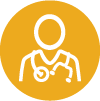Chemotherapy involves routinely putting strong drugs in your body to kill cancer cells. After each session, you may find yourself feeling fatigued and sore in addition to lacking an appetite, feeling nauseated, or having an upset stomach and diarrhea.
Although these are normal side effects, not everyone experiences them. Your care team at the Cecil B. Highland, Jr., and Barbara B. Highland Cancer Center at UHC will speak to you about how to manage side effects so they don’t leave you feeling unwell for too long.
Self-Care Tips During Chemotherapy
Because your immune system is so weak right now, it is important to avoid any risk of infection. If you’re visiting people, ask if anyone has recently had a cold or been sick with the flu or other contagious illness. You may need to postpone your visit until everyone in the household has been well for several weeks. Limiting exposure to large groups of people, such as at a mall or sporting event, is essential as well. With so many people present in one location, it is impossible to know who may have a contagious virus.
We also recommend that you take the following precautions with your food:
- Double check to make sure you don’t consume undercooked or spoiled food
- Store foods safely to prevent spoilage
- Avoid raw meat and fish
Additionally, wash your hands with soap and water after:
- Being outdoors
- Changing a diaper
- Using the bathroom
- Touching doorknobs or shared telephones
- Contact with any bodily fluids, including your own
Keeping your house as clean as possible helps you to avoid infections. If you have a cat, arrange for someone else to change the litterbox daily. Speaking of pets, avoid playing rough with dogs or cats as this could lead to scratches or bites that could get infected. Your doctor will let you know if you should get the flu vaccine or any other vaccine to help prevent further threats to your immune system.
Be sure that you take in enough protein and calories to maintain your energy level. If food makes you feel ill, talk to your doctor about nutritional supplements. Make it a point to remain active by taking a walk every day, refrain from smoking, and practice sun safety by wearing a wide-brimmed hat and sunscreen with an SPF factor of at least 30.
Mouth Care
Since chemotherapy may cause a dry mouth and sores, a good oral healthcare routine is important. Lack of attention to oral hygiene can increase bacteria in your mouth that can spread to other parts of your body. Be sure to brush your teeth and gums with a soft toothbrush two or three times a day for at least two minutes each time. Using a toothpaste with fluoride will get your teeth the cleanest. Don’t forget to floss once a day as well, if allowed by your physician. Rinsing your mouth several times a day with a baking soda and salt solution helps to eliminate bacteria even more.
Hair Loss Issues
Hair loss is a common side effect of chemotherapy. Some people become completely bald during treatment while others develop thinning or patchy hair. Hair typically falls out in clumps and becomes progressively thinner. Losing hair can be an emotional issue for many people because it affects appearance so drastically. If you feel self-conscious because of it, you may want to invest in a wig or hairpiece. Some patients choose to wear a hat or scarf instead and still, others are fine with the temporary bald appearance. Talk to your healthcare provider if hair dyes or permanents are permissible in your case.
When to Contact Your Doctor
Please don’t hesitate to call your doctor at the UHC Cancer Center if you have any of these problems after chemotherapy:
- Pain or burning when you urinate
- Chills, fever, or sweats since these could be signs of infection
- Difficulty breathing
- Bloody or prolonged diarrhea
- Severe nausea or vomiting
- Worsening cough
- Headache that doesn’t go away
- Extreme lethargy or weakness
- Abdominal pain
- Yellow skin
- Drainage, redness, or swelling from any spot where you had an IV line
- New blisters or skin rashes
The Conclusion of Chemotherapy
Once you have finished chemotherapy, you naturally look forward to your life returning to normal. The National Cancer Institute states that many patients are surprised at the need to create a new normal way of life during the first few months of chemotherapy.
Some people find that life takes on new meaning and they feel a greater sense of urgency to make a difference than they did before treatment. Others feel frustrated at the changes they must make to feel better long-term, such as a complete overhaul of their diet. The way you feel is just fine. Every cancer patient needs to make peace with their life after treatment.
Please note, the information provided throughout this site is not intended or implied to be a substitute for professional medical advice, diagnosis or treatment. All content, including text, graphics, images, and video, on or available through this website is for general information purposes only. If you are experiencing relating symptoms, please visit your doctor or call 9-1-1 in an emergency.
Please note, the information provided throughout this site is not intended or implied to be a substitute for professional medical advice, diagnosis or treatment. All content, including text, graphics, images, and video, on or available through this website is for general information purposes only. If you are experiencing related symptoms, please visit your doctor or call 9-1-1 in an emergency.

